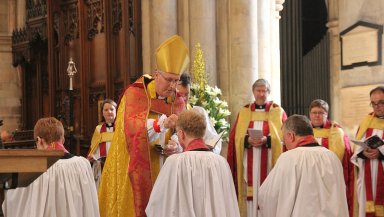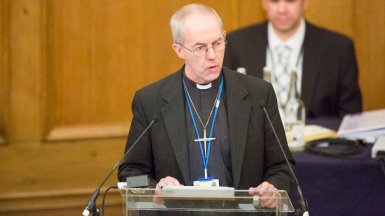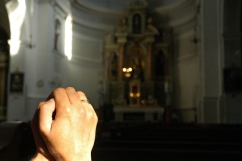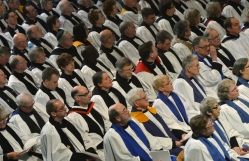
Today's release of the latest figures on ministry deployment in the Church of England provides both a warning and encouragement for church leaders. Although there is a looming crisis in numbers of stipendiary (salaried) clergy, there are signs that the Church is slowly turning the employment corner.
The report brings to the fore the impending large number of stipended clergy (those who draw an income from the church, usually running a parish) about to retire. More than 25 per cent of current vicars will be drawing their pension in the next decade and there aren't enough new priests coming through at the start of their Church "career" to make up the numbers. The situation is even more stark in some areas. Canterbury and Truro Dioceses will see a staggering 40 per cent of their clergy retire within 10 years and there are significant numbers currently in their 50s coming up behind these soon-to-be OAPs looking to draw their own pension shortly afterwards. In some dioceses there appears to be little evidence that this impending employment crisis is being addressed.
At the other end of the age scale there is some positive improvement. For the first time in decades there are more men and women in their 20s and 30s coming through the Church of England training institutions than there are in their 50s. In particular there is a positive explosion of those in their 30s who are being ordained, but this is not yet enough to counter the large exit of priests at the other end of the career lifecycle. One interesting feature in the data is that there are enough women coming through the system to replace those leaving, even though large numbers who were ordained when the Church of England lifted the ban on women priests in the 1990s are now moving into retirement. The ratio of male to female clergy seems to have stabilised over the past five years though senior appointments are increasing their female representation in line with this ratio.
The large number of older clergy causing the demographic time bomb was caused by an emphasis in the 70s and 80s and into the 90s on having clergy with plenty of "life experience". The result was that younger men were turned away from ordination and never came back. It has taken almost a generation to even begin to correct that trend but now with initiatives like Call Waiting is positively boosting young vocations.
Another area of challenge is the recruitment of ethnic minority clergy. Despite their best efforts the Church of England has failed to attract many non white men and women over the past decade and the proportion of priests who are BAME (Black and Minority Ethnic) has barely shifted in that time. Again, the Church of England has responded and only last month advertised for a full time post specifically encouraging vocations from minority ethnic groups.
The ministry statistics pick up on the increasing tendency of pre-retirement age clergy to not be in full time paid ministry. Almost a third of all clergy who aren't yet drawing their pension are in a similar situation to me – earning a salary in secular employment and offering the Church as much of their time as possible. In some dioceses the Church is increasingly reliant on such ministry but far too often such "self supporting ministers" don't receive the same kind of support or recognition as full time clergy. This is an "employee" relations issue that the Church of England needs to deal with urgently as its ministry in many parishes is contingent upon those who don't need the Church to pay their bills.

There are now real issues with some dioceses already being unable to fill vacant posts despite having the money to pay for them. The absence of long term planning has led in part to a preponderance of clergy in the South and a large number of vacancies in the North. There is no central "dating agency" of clergy and vacancies that attempts to link up those looking for jobs with parishes seeking new vicars. This situation will only get worse into the 2020s despite much needed initiatives from the HQ of the Church of England like "Renewal and Reform" which is attempting to streamline some of the bureaucracy and red tape that gets in the way of real ministry in the Church.
It's not all doom and gloom, though. This month we will have the next round of ordinations and they promise to be near record numbers. When you read the stories of those being ordained to the diaconate or priesthood you realise that God is still very much at work in England, calling his people and equipping them for ministry. Initiatives like Thy Kingdom Come demonstrate that the Church of England takes its role of evangelising and pastoring the nation incredibly seriously. Although there are still issues to be faced, the central authorities in the Church are recognising the problems to be tackled, being realistic about failures in the past and doing their best to shape the Church for the future. We might yet have some parishes that struggle to employ a vicar, but increasingly we have men, woman and children in the pews who take their faith seriously and live it out in ways not imagined a generation ago. God has not finished with the Church of England yet.
Rev Peter Ould is a priest in Canterbury Diocese and works in the financial sector.


















